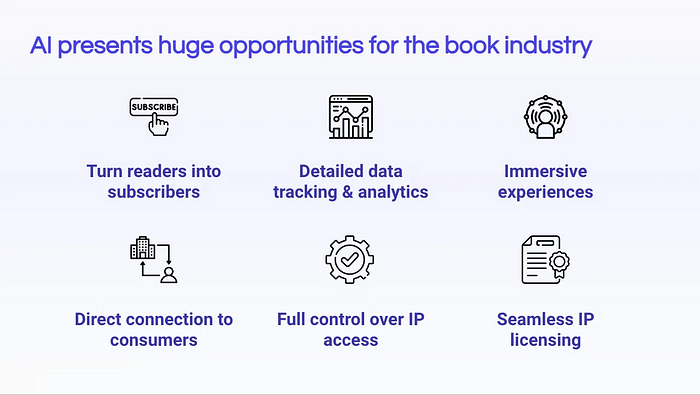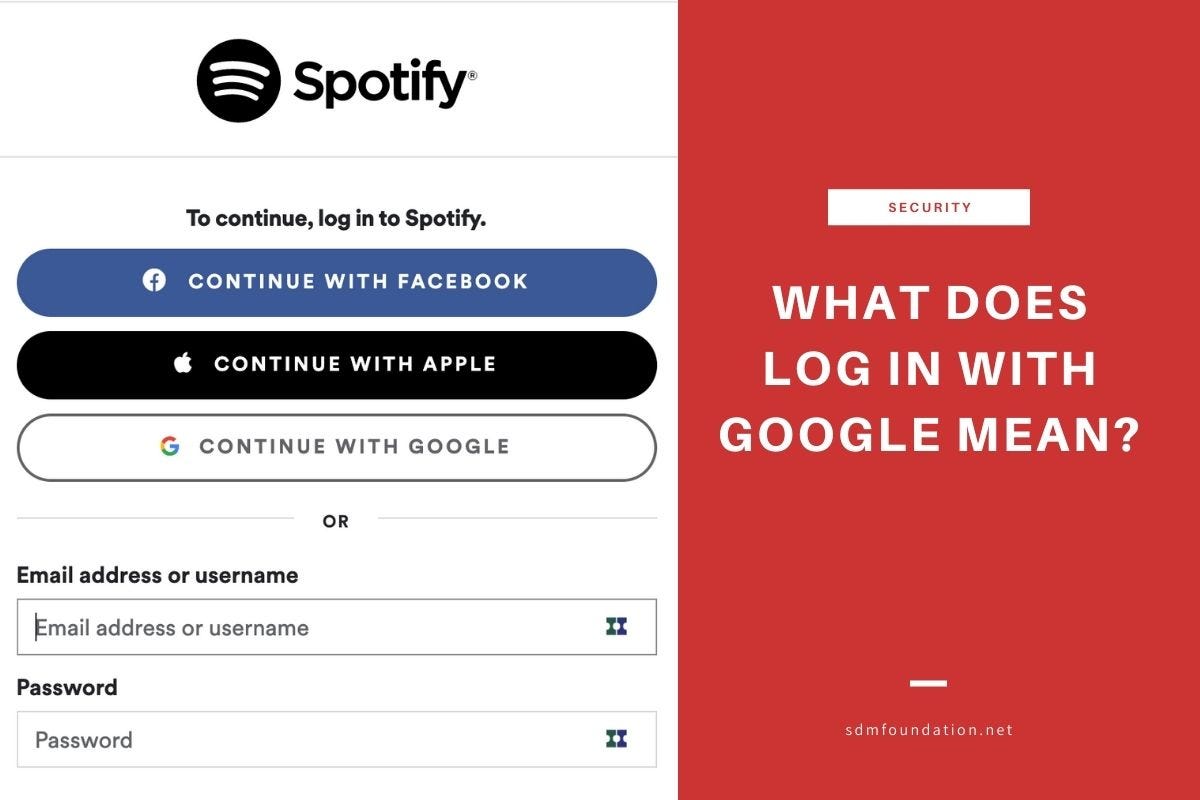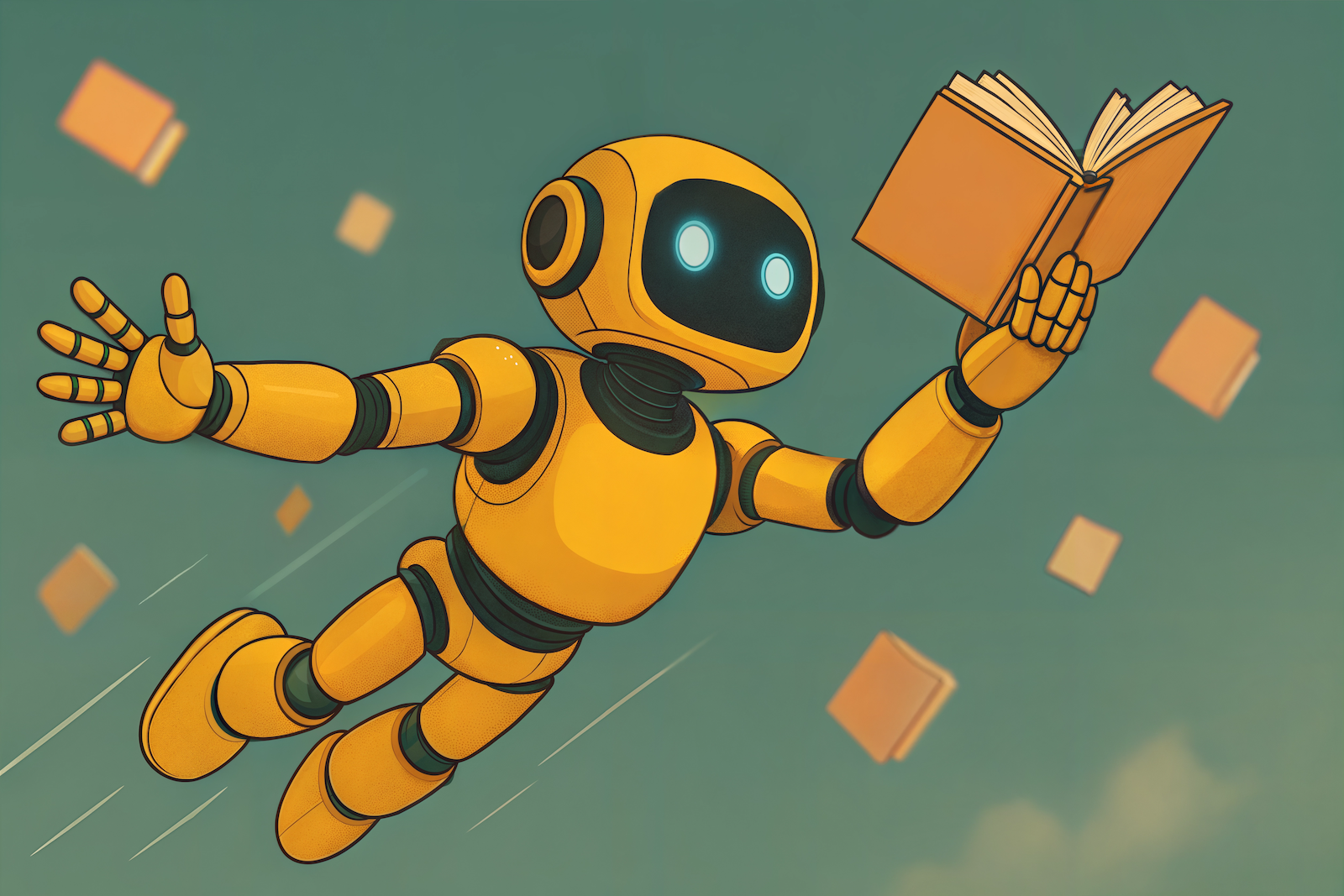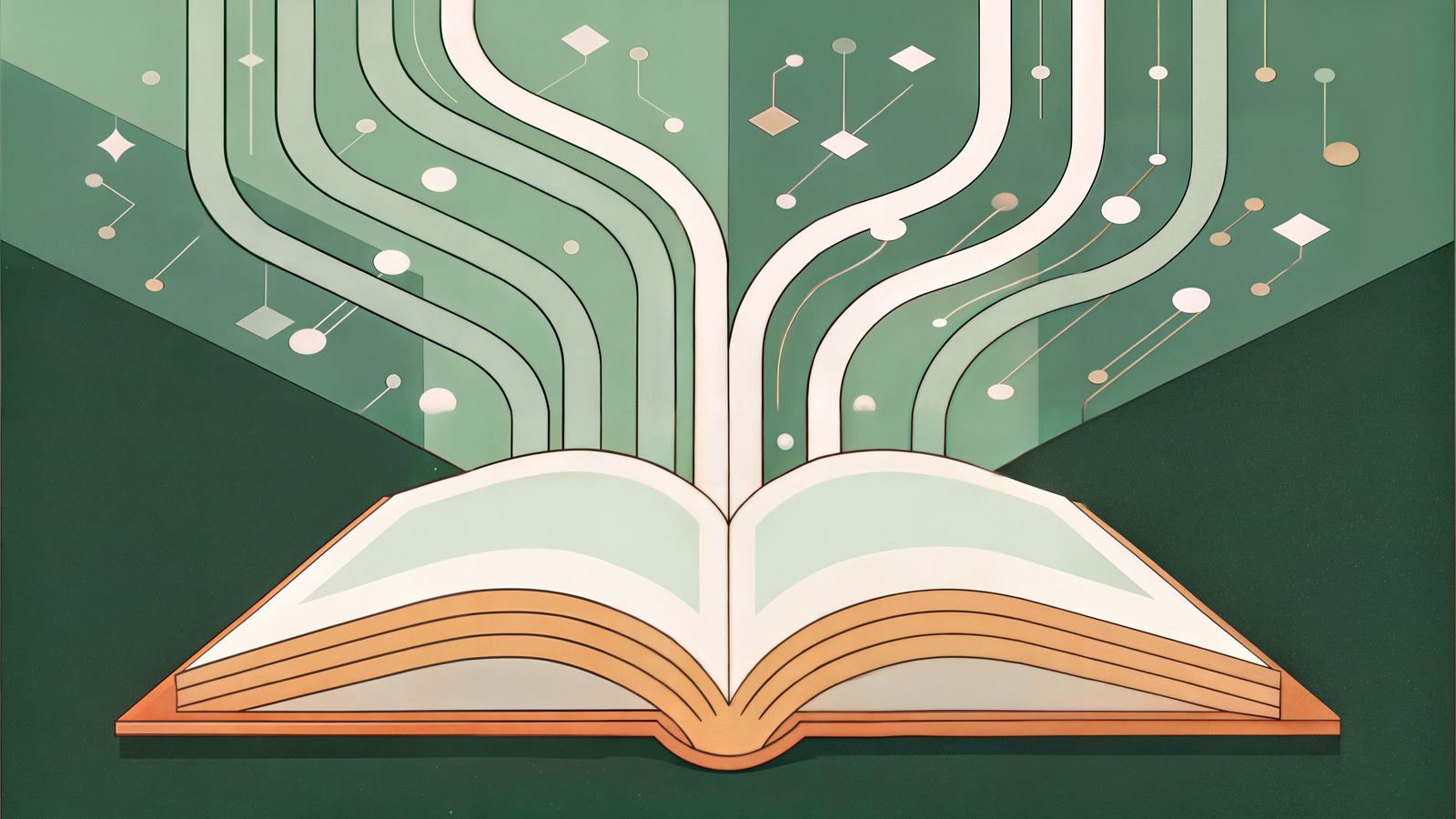In the previous article, we discussed how licensing of book data should work in AI / book publishers agreements, and where the primary concerns of consent, credit, and compensation break down in the traditional model.
We touch on how Inference represents a much more massive opportunity than licensing Training, and how books are currently better situated for use in Training AI, and not for Inference.
In this article, we continue that conversation by outlining a vision for the future of AI and books from both the reader and the publisher's perspective, discuss 6 things that need to change to unlock that future, and ultimately provide a call-to-action for you, the reader, to get involved.
A 360° Vision for the Future of Books
The future of books and AI can be viewed from two perspectives — that of the reader and that of the book industry.
The central assumption in this section is it requires (1) some changes in how we think about licensing book data and (2) some technological infrastructure that puts control of consent, compensation, and credit in the hands of the IP holders, which we’ll discuss further in the final section.
If we assume those to be true, let's explore what that future could look like.
Also…if any of these ideas feel like science fiction, I assure you that in every case, they are science fact—completely doable with existing technology—much of which I have firsthand knowledge of because I've written the code for it myself.
Let’s start with the reader's experience.
The Future of Books for Readers
Integrating AI into the realm of books opens up many possibilities that extend far beyond intelligent book recommendation systems.
There are a few ideas that I think represent the tip of the iceberg.
AI books for recreational readers
Imagine an AI reading companion that transforms your reading experience into a dynamic, interactive journey.
This companion could seamlessly blend listening and reading, allowing you to switch between or even combine both modalities simultaneously.
Need a summary of the last chapter because you set the book down for a month? Ask the AI companion and it can bring you up to speed.
Confused about a character's motivation? Ask the AI companion, and it will provide contextual insights to enhance your understanding.
This AI could offer hands-free functionality, and allow you to talk with an AI narrator as if the human narrator was reading the book to you personally.
I often listen to books when I'm running or biking, and hear something and think “This is perfect for my colleague, they need to hear this” or “I want to look this up later”.
With audiobook apps today, there isn’t a simple way to handle these types of interactions. Have you ever tried to find your notes in Audible?
The way I solve this today is I stop and pull out my phone, and then do a quick Google search, and leave the tab open so I can come back and find it later.
But imagine if you could just ask your AI companion, hands-free, and it would take a contextual note for you, dig into specific parts of the book, or handle the request immediately.
Personalized Audio Narration
With AI-powered audiobooks, you could tailor the narrator’s voice to your liking.
Want Barack Obama to narrate your business non-fiction reads? Or perhaps you’d prefer Michael Kramer for all of your fantasy novels?
Or perhaps you want Harry to have the voice of Daniel Radcliffe and Alan Rickman as Snape.
Audiobook narrators could license their voices as digital clones, giving readers unprecedented control over their auditory experience.
AI books in Early Education
For early childhood education, an AI reading companion could revolutionize how children learn to read.
It would assist them in recognizing letters and words, providing guidance with unlimited patience. The AI could make learning interactive and fun, adapting to each child’s pace and style.
It could offer instant translation, teaching new languages on the fly without any additional effort required from the IP holder to manage translations.
Want your children to learn Spanish or Chinese? Your child’s AI reading companion could help teach them.
AI books in Higher Education
In higher education, textbooks could become interactive learning platforms powered by dynamic AI tutors.
Students could ask questions and receive not just factual answers but also guidance on where to find more information within the text.
The AI tutor could generate quizzes on the fly, assess a student's understanding, and adapt the difficulty of questions in real time to address specific learning needs.
AI books in Business
There is already a proven market for book-based businesses for business.
Book Summaries
For instance, consider the market for book summaries, where companies like getAbstract, Blinkist, and Headway play.
The process of licensing books for content creation is a demanding and laborious process that requires dedicated resources.
For this reason, summary libraries are limited in scope, and some of the companies don’t even license book content directly and instead skirt the fringes of copyright law.
The improved infrastructure required for AI-powered books would expedite the licensing process, allowing more of these companies to not only legally use book content, but also expand the number of books that are included in their libraries.
This could expand their audiences, reduce costs, and allow them to channel more revenue back to IP holders.
Professional Development & Consultants
Companies like BookClub and Campfire build professional development programs using AI and books and often work with creators to provide them with digital tools to serve their customers.
Better infrastructure could open up a world of resources for authors and consultants to magnify their abilities and expand the impact of their IP both in scope and duration.
Book-based Coaching
Today, Jim Collins, author of Good to Great, has a consulting agency that runs workshops, seminars, and coaching.
Imagine Jim Collins creating and then licensing a virtual leadership coach powered by AI to all of his clients.
This virtual coach could be trained on the knowledge from all his books, enabling leaders at every level to interact with a “virtual Jim” for guidance on leadership challenges and personal development.
Subscribers to his service could become part of a broader network, sharing experiences and learning collaboratively, and Jim Collins could learn how his clients are using his coach and what the most common challenges they’re facing are, giving him insight as to what to write his next book about.
Corporate L&D Teams
Businesses that leverage books as part of their company culture could access entire libraries of content to build customized training programs.
AI-powered text, audio, and video materials could be contextualized to meet specific organizational needs, making training more relevant and engaging for both readers and non-readers alike.
Relevant case studies could be tailored to align with the company’s industry or challenges, enhancing the applicability of the learning material.
The Future of Books for the Book Industry
The potential for AI to completely transform the book experience for readers is massive. But potentially even more massive is what AI could unlock for the book industry itself.
License content to book-based AI applications
Today, readers can purchase copies of “digital books”, in the form of ebooks, but they don’t own these books the way they own physical books.
Their purchases end up living in specific ecosystems, and other than reading it, there is very little the user can do with it.
Imagine a scenario where readers purchase copies of digital books through transactional payments, much like they do with physical books today.
However, these digital books would be fully owned by the reader, and the reader could choose to “plug” their book into different applications.
For example, each of the reader experiences described in the previous section could be a separate application, with their own business models layered on top.
With this model, the IP holder — the author or publisher — could have full control over the terms of how consent, credit, and compensation work within each application.
If they didn’t want an application to use their data, or there was a use case they were not comfortable with — then they could specify that in the digital book, and it would prevent it from happening.
New Revenue Models
Books have historically been confined to very limited subscription-based business models, such as Audible or a "book-of-the-month" type subscription.
However, with ownable digital books, we could create applications that allow readers to subscribe to their favorite publisher or author, gaining access not just to content but to a community.
Similar to how you can subscribe to video streaming services like Peacock or HBO Max and access all the content from those media companies, the same could happen for specific authors or publisher imprints.
Take Brandon Sanderson, for example.
He has run record-breaking Kickstarter campaigns to fund his books and ideas.
But what if readers could subscribe directly to Brandon Sanderson, with different tiers providing varying levels of access to his IP, including the entire library of books he has written, and will write in the future?
Much like his Kickstarter campaigns, but on a recurring basis, this would eliminate the need to launch new campaigns and build a community of supporters who are continuously engaged.
Fine-grained licensing controls
Publishers could maintain ownership of their IP while tracking where it is used, who is using it, and what they are doing with it.
If they are uncomfortable with a particular use case, they would have fine-grained control to disable it. By establishing common licensing agreements, the ability to connect use cases with approved revenue-generating activities could be dramatically accelerated.
Currently, publishers and agents spend countless hours and dollars negotiating contracts and ironing out the details of partnership arrangements. I know, because we had an entire team dedicated to this in the early days of BookClub.
With better systemic tooling, this process could become nearly instantaneous for digital applications, saving time and money, and bringing exciting experiences to readers faster.
Publishers that adopt these solutions would also have a competitive advantage in winning authors to their firms, as they could move more swiftly and be more responsive to market needs.
Unprecedented data access
Publishers and authors could gain access to data in ways they’ve never experienced before.
They could see exactly which books are sold, at the moment they’re sold, who it was sold to, and through which channels (instead of waiting for the high-level weekly NPD report).
They could understand how readers engage with their content — what apps they’re using, which parts of the books are most popular, and which ideas are trending in the market.
They could analyze how consumption patterns change over time, providing valuable insights to predict which types of books will most appeal to readers, what the market needs or wants, and perhaps most intriguingly, where there are gaps in the content landscape.
I think one of the big roles book publishers play today, and will play an even bigger part in the future, is the ability to help bring big ideas to market, and then help structure those ideas in a way that resonates with people.
Having more direct, accurate data around what data is used and how will allow publishers to identify and bring big ideas to market faster than ever.
Participation in secondary book markets
Opening up secondary markets is another exciting possibility.
When readers truly own their digital books, they gain the power to do anything they want with them, including reselling.
With physical books, authors and publishers cannot dictate the rules of reselling, but with digital books, they would have a say.
They could participate in the resale market of digital books, with a percentage of the resale transaction returning to the IP holder.
This would have huge implications in higher education and collectors markets.
Readers could rent out their books.
Today, you can borrow books from services like Libby, but for popular titles, you might wait months to get access.
Meanwhile, there are purchased copies of the same book sitting unused in people’s Audible accounts eternally after they’ve listened to them.
We live in a sharing economy — people rent out their homes (AirBnB), their cars (Turo), their time (TaskRabbit), and their talents (Fiverr).
What if you could do the same thing with your digital books, with a portion of the rental fee going back to the IP holder? Let your audience do your marketing for you.
Limited-run digital prints
People think just because something is digital means there could be infinite copies of it.
But what if there weren't?
What if you had digital books as limited-run series? Or what if authors provided personalized notes in specific copies, or annotated their own book with commentary and included it with limited editions?
It could help drive demand and capture latent interest from the author's biggest supporters. It could help incentivize usage in secondary markets and prevent brand dilution.
These limited-run editions could entitle the owner to special access and events.
Maybe JK Rowlings holds a private screening of the next Fantastic Beasts movie for the owners of the pre-release edition of her next book, or Jim Collins provides unlimited personalized access to his services to the 10 owners of his $100k limited edition run of Good to Great.
The opportunities are endless.
Digital narration
We discussed digital narration from the reader's perspective, but there's a huge opportunity from a business perspective as well.
For instance, audiobook narrators could license their voices.
They could set limits on the types of use cases where their voice could be used, perhaps avoiding genres or authors they’re uncomfortable with.
This opens up new revenue streams for narrators and adds personalization options for listeners.
Or services could be created that charge parents to generate AI models of their voices, which would allow them to “read” every audiobook for their children.
Direct access to the market
One of the most significant opportunities, I believe, is that with the right tooling, publishers could have direct access to their audience.
They wouldn’t have to sell exclusively through other channels or remain disconnected from their readers as they are today.
Through these systems, publishers could build direct relationships with readers, shifting the balance of power away from distributors like Amazon and back into the hands of the IP owners.
The opportunities are limitless
Truly. The ideas I have listed here are the ones my team and I have come up with over the years as we’ve pondered the possibilities of AI and books.
But the incredible thing about building systems that open up ecosystems is the imagination of the human mind is endless, and provided the proper tooling, the things people can create are truly endless.
My hope is that presenting a few of the big ideas here, it can help to paint a picture of what could be possible.

What needs to change to enable this vision of the future of books with AI?
Before I dive into the specifics, I'd like to reiterate my stance.
I believe books deserve to have a vibrant future, and book publishers play a critical role in making that future happen. I am an entrepreneurial technologist who is pro-books, pro-publishers and pro-authors.
Everything I have to say comes from a desire to help.
I understand there are reasons why things are the way they are, but as the saying goes — no pain, no gain.
Some of these changes might be no-brainers, while others could be challenging — and I know there are countless reasons people might say it won’t work.
Think of me as a trainer at the gym. I see the potential you have, and I'm going to push you in ways that might be uncomfortable but are necessary to achieve your potential.
There are six fundamental changes I believe need to take place:
1. Establish Industry-Wide Licensing Standards for AI Applications
Licensing books today is like navigating a labyrinth blindfolded — it’s overly complicated, time-consuming, stifles innovation, and I believe is the primary driving force behind Alex’s concern.
It needs to be easier to license book content for usage with AI.
Consider how other industries have tackled similar challenges.
In the banking sector, consortia of banks have come together to build financial infrastructure, making it seamless to transfer money across institutions.
Airlines have formed alliances, aligning on standards to simplify booking tickets and coordinating logistics across networks.
In the tech world, organizations like the World Wide Web Consortium (W3C) develop web standards so that the Internet functions smoothly for everyone.
Book publishers could do something similar.
By forming a consortium or alliance, publishers can create standardized licensing agreements and protocols that make it easier for AI companies to license book content for AI-based applications.
This not only streamlines the process but also ensures that publishers and authors maintain control of their IP.
2. Secure Book IP with Public Advanced Digital Rights Management
We don’t want books leaking into the public domain unintentionally or being used in ways they shouldn’t be — securing book IP should be of top concern.
Therefore, one way to securely and publicly store books would be to encrypt and write them on the blockchain.
This would provide a secure ledger that ensures only those with permission can access and decrypt the content, with full traceability.
With blockchain-based smart contracts, you could dictate, on a per-book basis, who has access to a book, what they can do with it, and for how long.
For instance, maybe JK Rowling would be comfortable with her books being used with an AI reading companion app, but not with an app that helps fans write “authorized” fan fiction — she would have control to do that using a system like this.
We could also implement digital watermarks for traceability, which can help monitor where and how book content is used, and provide culpability in security breaches.
By managing access carefully, we can prevent unauthorized use while still encouraging legitimate, innovative applications.
3. Create a Standard Digital Book Format for AI
After working with digital book files for the last few years, I can authoritatively say that they are a mess.
Not only are there a plethora of incompatible, competing formats, but there is no consistency in how their content is structured.
This makes it extremely difficult for developers to build applications with them, which ultimately slows innovation.
Standards unlock ecosystems.
Consider the example of Milwaukee’s battery system for power tools.

Milwaukee created a standardized battery that works across all their tools, which not only simplifies things for consumers but also encourages them to invest more deeply in the ecosystem.
Similarly, a standard digital book format would encourage AI developers to create new and exciting applications and continue to invest in the ecosystem knowing they can reliably work with the content.
4. Simplify Access to Book Content
Building on the previous points, we need to make it easier to access books digitally, both for individuals and applications.
Tech has already solved for how to securely, easily, and safely transfer sensitive data between applications.
Have you ever signed up for a website using your ID from another website, like your Facebook, Apple, or Google ID?

Spotify does this.
Spotify had to obtain permission from Facebook, Apple, and Google just to request access to your data, and then once they have permission from those applications, they still need your permission (as the user) to actually access your personal information.
It’s a two-step process that prioritizes security and consent, yet it’s seamless for the user and broadly adopted.
A similar model could work with books.
Book applications could apply with publishers for access to their IP, specifying how they’re going to use the data.
Once the application is approved, individual access can be checked to ensure individuals have the right to access specific pieces of data. Once those permissions are in place, accessing the content should be easy.
This approach ensures that consent is obtained at both the application and individual levels, without putting unnecessary barriers in the way of legitimate uses.
5. Develop New Payment Models
The way we sell and license books needs to evolve.
Currently, it’s binary — you purchase the entire book or not at all.
But AI applications like LLMs might not need access to the entire book; they might only need a chapter or even a few paragraphs.
Allowing books to be purchased or licensed in parts opens up new possibilities.
Facilitate micro-payments by allowing applications to pay to access only the portions it needs, for the specific use case it has, both on a temporary and permanent basis.
This can facilitate both transactional payments and subscription-based models.
The music industry made this same adjustment with the introduction of the iPod in the early 2000’s, by allowing users to purchase a single song instead of the whole album, and building streaming services instead of transactional marketplaces.

This flexibility can create new revenue streams and make it more attractive for developers to work with book content, and for readers to consume it.
6. Empower Digital Book Ownership
Currently, when you buy a digital book, you don’t truly own it — not in the way you own a physical book.
With a physical book, you can highlight it, lend it to a friend, annotate it, or even resell it if you want to.
Early editions of books have value, and copies owned by notable individuals can become collectors’ items.

In the early days of technology and the internet, when it was impossible to prove ownership of a digital asset—it made sense why this was not a thing.
But with the ability of the blockchain to immutably cement IP and prove individual ownership—why should digital books be any different?
People should be allowed to truly own their digital books and control what they do with them.
This could involve allowing for personal annotations, lending their digital books to a friend, or even reselling them.
By embracing this, we honor the traditions of book ownership while adapting to the digital age.
Additional considerations
I recognize I’m pretty pragmatic about my recommendations, and various other aspects of this conversation demand attention, such as the broader cultural, ethical, and educational issues that I didn’t even touch.
My hope is this starts a conversation that drives toward the changes needed to forestall Alex’s grim prediction and enable the hopeful vision I’ve outlined in this ebook.
Now what?
The transformative potential of AI in the world of books is immense, but realizing it requires the active engagement of forward-thinking individuals like you. If you’re interested in shaping this future and discussing ways to get involved, I’d love to connect.
Let’s talk directly about how we can make this vision a reality together. You can connect with me on LinkedIn or, if you prefer, schedule some time with me directly for a 1:1 conversation on how to get involved. Let’s build the future of books with AI, side by side.
This was the last article in a four-part series discussing the Future of AI and Books. If this was the first article you found, I’d encourage you to read the previous 3 articles to help provide some critical context.
- AI and the Future of Book Publishing
- The Current State of AI and Publishing
- Why the Established AI Content Licensing Model Breaks with Books
- Vision and Call to Action for the Future of Books and AI
If you’re a bit fuzzy on some of the AI terminology used in this article, I’d recommend reading my “Beginner’s Guide to Understanding Generative AI”.


.jpg)


